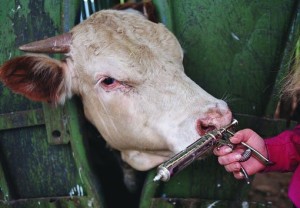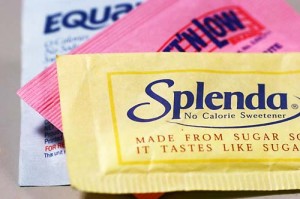F.D.A. Restricts Antibiotics Use for Livestock
Last week, the Food and Drug Administration announced new guidelines on antibiotic use for cows, pigs and chickens raised for meat. This is the agency?s first serious attempt in decades to curb the overuse of antibiotics in livestock which is generating a growing  epidemic of antibiotic resistance. The change, which is to take effect over the next three years, will effectively make it illegal for farmers and ranchers to use antibiotics to make animals grow bigger. Food producers will also have to get a prescription from a veterinarian to use the drugs to prevent disease in their animals. Under the new policy, the agency is asking drug makers to change the labels that detail how a drug can be used so they would bar farmers from using the medicines to promote growth. Here’s the catch – the changes are voluntary for drug companies. But F.D.A. officials said they believed that the companies would comply, based on discussions during the public comment period. The two drug makers that represent a majority of such antibiotic products ? Zoetis and Elanco ? have already stated their intent to participate, F.D.A. officials said. But if the drug companies do not live up to their promise, there are no penalties because the guidelines are merely recommendations. If the FDA won?t go far enough to get the job done, it?s time for Congress to act. Sign a petition today to ask your Congressperson to sponsor the Preservation of Antibiotics for Medical Treatment Act (PAMTA)/Prevention of Antibiotic Resistance Act (PARA), which would ban subtherapeutic uses of antibiotics in livestock production.
epidemic of antibiotic resistance. The change, which is to take effect over the next three years, will effectively make it illegal for farmers and ranchers to use antibiotics to make animals grow bigger. Food producers will also have to get a prescription from a veterinarian to use the drugs to prevent disease in their animals. Under the new policy, the agency is asking drug makers to change the labels that detail how a drug can be used so they would bar farmers from using the medicines to promote growth. Here’s the catch – the changes are voluntary for drug companies. But F.D.A. officials said they believed that the companies would comply, based on discussions during the public comment period. The two drug makers that represent a majority of such antibiotic products ? Zoetis and Elanco ? have already stated their intent to participate, F.D.A. officials said. But if the drug companies do not live up to their promise, there are no penalties because the guidelines are merely recommendations. If the FDA won?t go far enough to get the job done, it?s time for Congress to act. Sign a petition today to ask your Congressperson to sponsor the Preservation of Antibiotics for Medical Treatment Act (PAMTA)/Prevention of Antibiotic Resistance Act (PARA), which would ban subtherapeutic uses of antibiotics in livestock production.
Baking With Splenda Releases Cancer-Causing Chemicals
An in-depth study review, recently published in the Journal of?Toxicology and Environmental Health, found that synthetic sweetener sucralose, which is sold under the brand name Splenda, releases cancer-causing dioxins in  food when baked or heated. Cooking with sucralose at high temperatures was reported to generate chloropropanols, a potentially toxic class of chemicals that may be linked to a higher risk of cancer. The study also disputes earlier studies cited by Splenda?manufacturer McNeil Nutritionals?that sucralose passes through the digestive tract unchanged. The study suggests instead that some of the ingested sweetener is metabolized. The health effects of the metabolization are currently unknown. In rats, sucralose alters the microbial composition in the digestive tract, with a high reduction in beneficial bacteria necessary for digestion. Earlier this year,?the Center for Science in the Public Interest (CSPI) downgraded sucralose in its?Chemical Cuisine?guide to food additives. CSPI had long rated sucralose as safe, but demoted it to the ?caution? category pending a review of an unpublished study by an independent Italian laboratory that found that the sweetener caused leukemia in mice. The only previous long-term feeding studies in animals were conducted by the Splenda’s manufacturer.
food when baked or heated. Cooking with sucralose at high temperatures was reported to generate chloropropanols, a potentially toxic class of chemicals that may be linked to a higher risk of cancer. The study also disputes earlier studies cited by Splenda?manufacturer McNeil Nutritionals?that sucralose passes through the digestive tract unchanged. The study suggests instead that some of the ingested sweetener is metabolized. The health effects of the metabolization are currently unknown. In rats, sucralose alters the microbial composition in the digestive tract, with a high reduction in beneficial bacteria necessary for digestion. Earlier this year,?the Center for Science in the Public Interest (CSPI) downgraded sucralose in its?Chemical Cuisine?guide to food additives. CSPI had long rated sucralose as safe, but demoted it to the ?caution? category pending a review of an unpublished study by an independent Italian laboratory that found that the sweetener caused leukemia in mice. The only previous long-term feeding studies in animals were conducted by the Splenda’s manufacturer.
Social Supermarkets A ‘Win-Win-Win’ For Europe’s Poor
With the recent cuts to food stamps here in the US, we may want to look towards Europe for a better solution to the growing hunger issues. “Social supermarkets,” are a? European model that offers discounted food exclusively to those in poverty, are growing in popularity across  the continent, and last week, the U.K. opened its first. Dubbed Community Shop, the store is located in an impoverished former mining town in South Yorkshire. Part discount grocer, part social service agency, the supermarkets are for members only. Membership is free, but it is limited to those who can prove they receive some form of welfare benefits. Members can save up to 70 percent on food that has been rejected by grocers because it might be mislabeled, have damaged packaging or be nearing an expiration date. That food is still edible, though, so instead of getting thrown away, it’s donated with a waiver of liability. Unlike food pantries the stores are designed for people who might have their own house and a job, but are still struggling to make ends meet. She calls the stores a “win-win-win” for everyone involved: manufacturers and retailers, customers, and the nonprofits that typically run the social supermarkets. The environment also benefits, since less food ends up in landfills. The social supermarket model has flourished in Europe since the 2008 economic downturn. In addition to cutting down their grocery bills, customers can take classes on cooking, budgeting, resume writing and more.
the continent, and last week, the U.K. opened its first. Dubbed Community Shop, the store is located in an impoverished former mining town in South Yorkshire. Part discount grocer, part social service agency, the supermarkets are for members only. Membership is free, but it is limited to those who can prove they receive some form of welfare benefits. Members can save up to 70 percent on food that has been rejected by grocers because it might be mislabeled, have damaged packaging or be nearing an expiration date. That food is still edible, though, so instead of getting thrown away, it’s donated with a waiver of liability. Unlike food pantries the stores are designed for people who might have their own house and a job, but are still struggling to make ends meet. She calls the stores a “win-win-win” for everyone involved: manufacturers and retailers, customers, and the nonprofits that typically run the social supermarkets. The environment also benefits, since less food ends up in landfills. The social supermarket model has flourished in Europe since the 2008 economic downturn. In addition to cutting down their grocery bills, customers can take classes on cooking, budgeting, resume writing and more.
British Drug Company Says It Will Stop Paying Doctors to Promote Drugs
The British drug maker GlaxoSmithKline just announced that it will no longer pay doctors to promote their products and will stop tying compensation of sales representatives to the number of prescriptions doctors write. The announcement appears to be a first for a major drug
 company. This decision comes at a time in which Glaxo is the subject of a bribery investigation in China. The company is accused of providing illegal payments to doctors and government officials in an effort to lift drug sales. Despite criticism, the practice of pharmaceutical companies paying doctors to speak on their behalf has existed for decades. Under the plan presented by Glaxo, it will no longer pay health care professionals to speak on its behalf about its products or the diseases they treat. These changes are long overdue. Unless other major drug companies enforce similar restrictions, bribes will continue to take place and compromise the health of patients.
company. This decision comes at a time in which Glaxo is the subject of a bribery investigation in China. The company is accused of providing illegal payments to doctors and government officials in an effort to lift drug sales. Despite criticism, the practice of pharmaceutical companies paying doctors to speak on their behalf has existed for decades. Under the plan presented by Glaxo, it will no longer pay health care professionals to speak on its behalf about its products or the diseases they treat. These changes are long overdue. Unless other major drug companies enforce similar restrictions, bribes will continue to take place and compromise the health of patients.

Comments are closed.